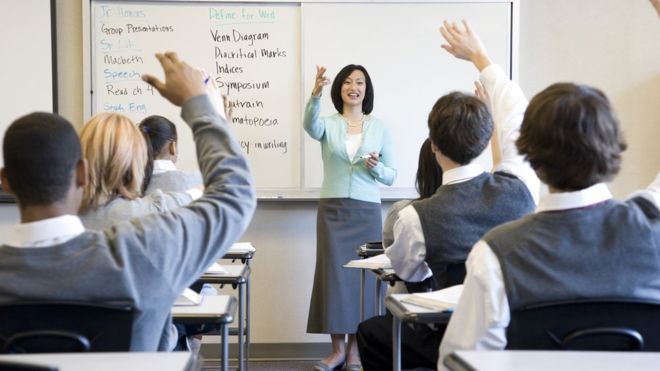
More than 16,000 new secondary school spaces are needed within seven years to accommodate new pupils starting primary education, official figures reveal.
Data analysed by BBC News shows the scale of the challenge to meet rising demand by the time current four-year-olds move schools.
Surrey County Council and Birmingham City Council face the biggest shortfalls.
The Department for Education (DfE) said £7bn is committed to new places.
Official figures reveal the number of applicants starting primary school in 2016 exceeds the number of current secondary school places by at least 16,284.
The analysis covers 134 areas but excludes 16 councils where there is a “three-tier” system, as the DfE did not account for children in middle schools, which typically cater for 9-13 year-olds.
See the figures for your area here.
Secondary school places needed
Excludes areas with middle schools
530,274
secondary school places in 2016
546,558
applicants for primary school
16,284 more secondary places needed in 134 areas
16 areas with middle schools
Source: DFE
Thinkstock
Figures released this week show one in six families missed out on their first choice of secondary school.
The DfE said local authorities had plans for 52,000 more secondary school places by 2018.
However, the National Union of Teachers said the problem of school places was being “ignored by the government”.
Kevin Courtney, acting General Secretary, said: “It is resulting in overcrowded classrooms, schools expanding beyond an optimum size and children travelling further to school.
“Population changes are not a new phenomenon and local authorities, who are responsible for providing sufficient school places, have traditionally been able to plan to meet rising and falling demand.
“The significant factor in the current situation is that, since 2010, the government has undermined local authorities’ legal powers to deliver new school places. This is an abdication of responsibility.”
Shortfall
Surrey County Council, which faces the biggest shortfall, said its needs were not being met by government funding.
Linda Kemeny, cabinet member for schools, said: “We need to create more than 11,000 extra school places over the next five years but, because demand is not being matched by extra funding from the government, it is leaving us with a shortfall of £30m in each of the next two years alone.”
Birmingham City Council had 2,056 more primary school applicants for 2016 than it had secondary school places, but said it was confident it would have sufficient space.
A spokesman said: “The increasing popularity of Birmingham as a place for young families to move to means each year group at primary level has increased annually over recent years.
“Although we do not need secondary places yet in most parts of the city, we are confident we will be able to work with the many schools that may wish to expand where and when places are needed, following the success of the primary school expansion programme.”
A DfE spokesman said: “Delivering good quality school places is a top priority for this government and the latest figures show that the system continues to work. The government has already committed £7bn for school places, which along with our investment in 500 new free schools we expect to deliver 600,000 new places by 2021.
“Our reforms and our academy programme are raising standards for all children with 1.4 million more pupils in good or outstanding schools than in 2010. We will continue to invest and work hard to ensure every child has an excellent education that allows them to reach their full potential.”


